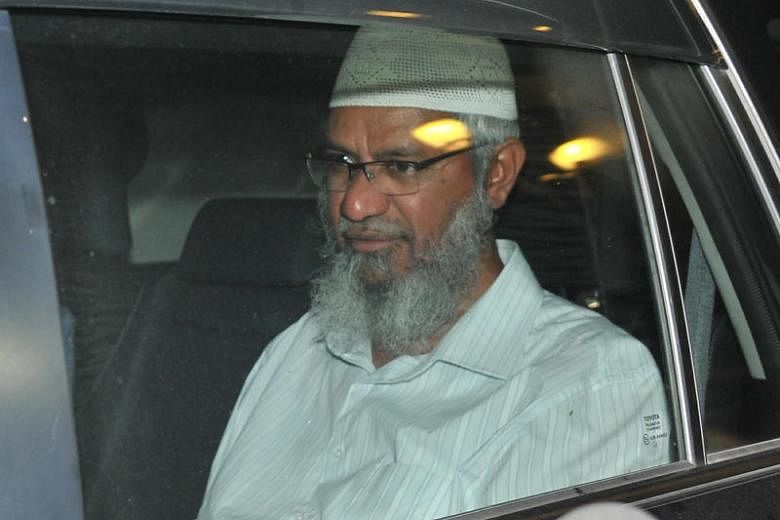KUALA LUMPUR (THE STAR/ASIA NEWS NETWORK) - In 10 days, we will mark our 62nd year of Merdeka but unlike last year when elation was in the air with a new government in Putrajaya, the prevailing mood is one of melancholy.
A year on, there is not much to show that we are doing better as a nation in terms of national unity and cohesion.
Instead, the deep fissures that threaten the very structure of the country have become more obvious, as seen daily on social media.
Race and religion remain the most divisive issues, as they were under the previous six-decade-long administration but with the comparatively freer media today, they are being stoked to incite animosity and even flagrant threats of violence.
On Aug 14, a man threatened to behead lawyer Syahredzan Johan for urging the withdrawal of controversial preacher Zakir Naik's permanent resident status in Malaysia. The 28-year-old security guard has been arrested and is being held under remand.
Last Saturday, an appalling video of man unsheathing three menacing weapons - a parang, a sword and katana (Samurai blade) went viral.
In the three-minute clip, he is heard threatening "impudent non-Malays" with violence as he demonstrates his supposed "invincibility" from harm by running the blades across his abdomen, hands and neck.
On Monday, police arrested a 43-year-old officer over a Facebook posting inciting Muslims to shed the blood of non-believers last Wednesday.
The man urged Muslims to "sharpen their parangs for kafir (infidels) who may want to become like sacrificial cows".
Shockingly, the suspect is said to be an assistant director with the Islamic Development Department Malaysia (Jakim).
In the wake of such provocations, the Malaysia Communications and Multimedia Commission (MCMC) has set up email and WhatsApp hotlines to lodge complaints against those who insult race, religion or the royal institution.
It's tragic that mistrust among the different races is rising even after 62 years of independence. Malaysia is more fragmented with its disparate communities having little interaction or empathy for each other.
In the elation following Pakatan Harapan's victory in last year's election, hopes were raised for "Malaysia Baru", a resetting of the nation towards a more progressive and equitable society.
The new vision, Shared Prosperity 2030, as announced by Prime Minister Tun Dr Mahathir Mohamad in May to mark Pakatan Harapan's first year in power, was aimed at ensuring fair, sustainable, and inclusive economic growth; fostering unity; celebrating cultural diversity; and creating decent living standards for all Malaysians.
But events and issues over the past few months, such as the move to introduce khat calligraphy, the resistance by Chinese educationist group Dong Zong, the furore against controversial Indian Muslim preacher Dr Zakir Naik and the Selangor government's plan to allow for one parent to unilaterally convert a child to Islam, have shown that the new government is not much different from the old Barisan Nasional when it comes to matters that are inextricably linked to race and religion.
With Umno and PAS upping the ante in playing the race card and the Pakatan Harapan's ebbing support in the Malay heartland, the new government has been treading very carefully.
In April, the government withdrew from the Rome Statute, after a storm of protests from Umno, PAS and Malay NGOs, which claimed that acceding to the treaty covering the International Criminal Court (ICC) would affect the sovereignty of the Malay Rulers.
Last year, it retreated from assenting to the International Convention for the Elimination of all forms of Racial Discrimination (Icerd) after similar protests.
As for the case of Zakir, who faces criminal charges of money laundering and instigating terrorism in India, non-Muslim Malaysians were dumbfounded by his hobnobbing with the Prime Minister, Education Minister Maszlee Malik and de facto Islamic Affairs Minister Mujahid Yusof Rawa, especially when the preacher openly supported the previous administration during GE14.
The government's earlier stance of refusing to deport the televangelist, who was given Malaysian permanent resident status by the previous government in 2015, was seen as a move to appease the Malay/Islamic vote bank.
But things have changed drastically for Zakir, who attracted a crowd of 70,000 and was treated like a VIP during a mammoth rally on Aug 3.
He is being investigated for intentional insults to provoke a breach of the peace by making disparaging remarks against Malaysian Indians and Chinese. He has also been effectively barred from speaking across the country.
On Sunday, Dr Mahathir said Zakir had "crossed the line" by delving into politics and stirring racial tension in the country.
Among other things, he was supposed to have said that Malaysian Indians were more loyal to the Narendra Modi government in India and described the Malaysian Chinese community as "old guests" who should go back to China before he is made to leave the country.
Claiming that his remarks were taken out of context, Zakir has filed legal action against Human Resources Minister M. Kulasegaran, Penang Deputy Chief Minister Dr P. Ramasamy, Bagan Dalam assemblyman Satees Muniandy, Klang MP Charles Santiago and former ambassador Datuk Dennis Ignatius.
Dr Mahathir's assurance that the rule of law will be imposed on the preacher has somewhat allayed fears that the government would treat him with kid gloves to placate his supporters.
The last thing our already tattered state of unity needs is a foreign agitator adding fuel to fire.
The writer is a regular commentator with The Star. The Star is a member of The Straits Times media partner Asia News Network, an alliance of 24 news media entities.

